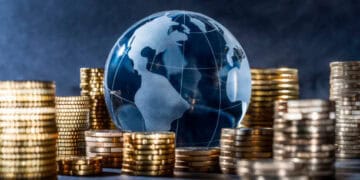China’s economic recovery in the wake of the COVID-19 pandemic is notable, with an 18.3% growth in GDP by the end of Q1 2021 compared to Q1 2020. This growth positions China as a significant contributor to post-pandemic global recovery. However, the potential for increased economic dependence on China by other nations has raised concerns. The current global health crisis highlights the vulnerability of economies to sudden outbreaks, suggesting that a resurgence could impact vaccine supply chains. Concurrently, China faces heightened competition from the U.S. and pressure from Western countries, raising questions about the future trajectory of the post-COVID world and China’s leadership role.
The 50th anniversary of ping-pong diplomacy, a symbol of the historic U.S.-China relations, has evolved into a more contentious relationship, with both nations openly labeling each other as primary threats. This shift is evidenced by the mutual sanctions and accusations reminiscent of their initial ping-pong engagements. Amidst these tensions, global military spending has increased, with China and other Asia Pacific nations boosting their military budgets. This rise in military expenditure reflects the escalating regional and global discord.
Recent events such as China’s suspension of strategic economic dialogue with Australia and the imposition of sanctions on Europeans by China in retaliation for sanctions against Chinese officials underscore the complex and often contentious state of international relations. The Boao Forum for Asia, an economic conference with over 4,000 attendees from more than 60 countries, highlighted Asia’s resilience and growth during the pandemic. The forum emphasized Asia’s role in regional integration, with the Belt and Road Initiative receiving significant attention.
Trade reports show ASEAN nations as China’s main partners, with trade reaching $191.4 billion in Q1 2021. The IMF predicts Asia to lead in economic recovery, which is a testament to the region’s robust response to the pandemic. However, China’s economic diplomacy is not without challenges. For instance, several African nations owe more than 25% of their foreign debt to China, leading to concerns over potential “debt traps.” Moreover, China’s relations with various countries, including those in Latin America, Africa, and Asia, are complex and subject to scrutiny over debt sustainability, environmental standards, and geopolitical influence.
China’s approach towards India, amidst border conflicts and the pandemic, reflects a nuanced and sometimes contradictory stance. While offering support, certain insensitive remarks by Chinese diplomats have sparked backlash. In international forums, China continues to promote cooperation and has seen growth in its economic and financial institutions, such as the Asian Infrastructure Investment Bank (AIIB). Despite the challenges posed by the pandemic, China’s Belt and Road Initiative persists, albeit with potential adjustments in investment focus.
China’s “wolf warrior diplomacy,” marked by an assertive and sometimes confrontational style, has attracted global attention. While some of the rhetoric may be driven by domestic politics and nationalism, it is also indicative of China’s evolving role on the world stage. Overall, China’s strategy reflects a pragmatic approach to international cooperation and economic expansion, adjusted for pandemic-related impacts and the behavior of other international actors. Despite the aggressive tone of diplomacy, negotiations with China continue to be possible and essential for global economic stability and growth.
Catch the latest in supply chain news on The Supply Chain Report. Visit ADAMftd.com for free international trade tools.
#ChinaEconomicRecovery #PingPongDiplomacy #PostPandemicGrowth #GlobalSupplyChains #ChinaUSRelations #ChinaMilitarySpending #BoaoForum #BeltAndRoadInitiative #ASEANTrade #ChinaDebtConcerns #AsianEconomicLeadership #WolfWarriorDiplomacy #ChinaIndiaRelations #AIIB #DebtSustainability #GlobalGeopolitics #InternationalRelations #ChinaEconomicDiplomacy #COVID19Recovery #ChinaLeadership #GlobalStability #ChinaInfluence

















